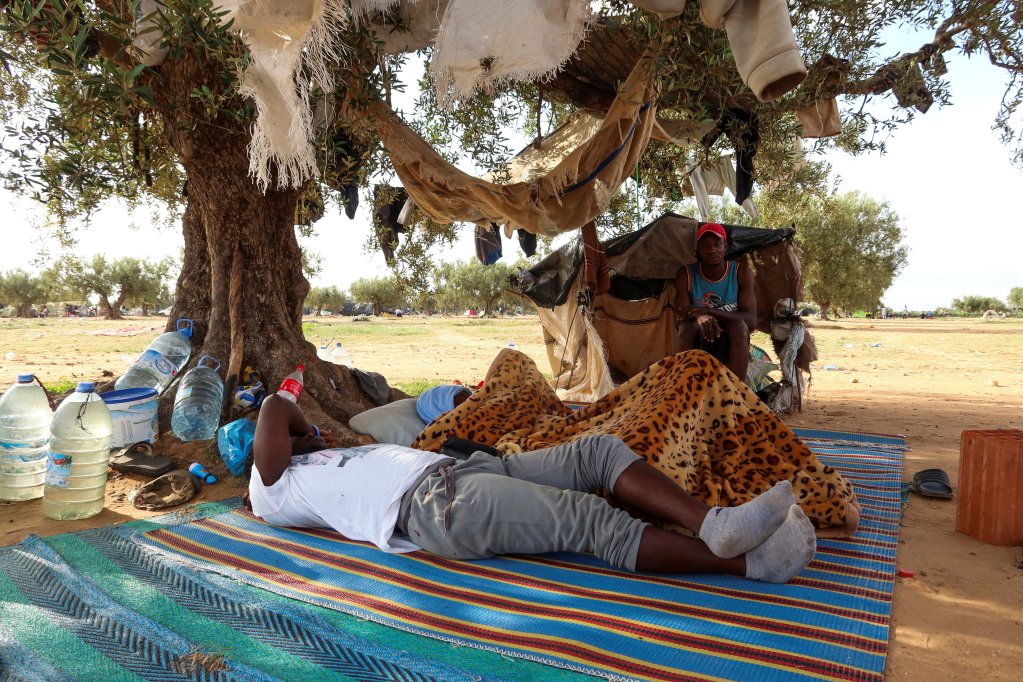Every year, migrants choose to return to Cameroon through the IOM voluntary return program, after months of suffering on migratory routes. To better support them and deal with the difficulties upon their arrival, the UN institution has signed a new partnership with the Cameroonian government.
"When I returned to Cameroon, I felt totally abandoned. My relatives blamed me for not having managed to go to Europe, they were angry with me. Then my carpentry workshop closed, and I had nothing left. I felt very lonely." Pierre Marie Ndzana returned home to Douala in 2018. His two years in prison in Libya and the "unimaginable horrors" he experienced there pushed him to turn back via the International Organization for Migration's (IOM) voluntary return program.
But getting his life back on track in Cameroon proved much harder than he had imagined. "I was very unhappy for three years," says Pierre Marie Ndzana. "Everyone said I had failed. Even my children, under the influence of other people, were disappointed in me. My trauma on the road and the rejection in my country destroyed me: in Libya, I was forced to bury the dead, and at home, no one understood me. I started smoking and drinking, losing myself."
To ensure that Pierre Marie Ndzana's story does not repeat itself for others, the Cameroonian government signed a new partnership with the IOM on January 6. The memorandum of understanding concluded in Yaoundé in the presence of the Minister of Youth and Civic Education Mounouna Foutsou, establishes "mechanisms to facilitate the voluntary return and reintegration" of migrants, through vocational training programs in particular, the news site 237 online wrote.
The project also plans for a strong mobilization of the private sector, in order to create local opportunities for migrants. A monitoring system will also be deployed to evaluate the impact of the partnership.
Read AlsoHow do UN Migration's voluntary returns work?
'When we return, we have nothing left'
These new proposals are an addition to the existing provisions for migrants who have voluntarily returned with the IOM. Thus, migrants who have chosen to return to Cameroon with the help of the UN institution receive upon their arrival on Cameroonian soil 100,000 CFA francs, or 150 euros, intended to cover travel and food costs. The program then provides for the payment of 700,000 CFA francs, a little over 1,000 euros, distributed in two installments for migrants who can prove they will embark on a reliable professional project.
Émilia, who returned to Yaoundé on December 19 after ten months spent between Algeria and Tunisia, is counting on this program to rebuild her life at home. "A week after my arrival, I had an interview with the IOM in Douala to present my project," she explained. "My goal now is to open my own restaurant that will combine African and French cuisine." This former hotel management student is now waiting for a response from the organization, which will call her in for a new interview. "I really need this money. Without the program, I can't do anything. When you go back, you have nothing left, it's hard to get back on your feet."
Read Also‘One failed journey is not the end of your life’ – fighting the stigma of return
The new partnership intends to focus on local entrepreneurship, often the only and unique opportunity available to returning migrants. Fifteen integration advisors from the Ministry of Youth, specializing in entrepreneurship, will therefore be made available to the IOM.
Daquin, who returned to Cameroon more than six months ago after a very difficult time in Tunisia, also sees no other solution than catering to get by. "My dream is to become a veteran in the sector and become a chef in a big restaurant. My passion is cooking," he says. The young man, like Emilia, presented his project to the IOM upon his arrival. "Since then, I have been waiting, and it is long. There is no work. I work a few hours a week in a butcher's shop but I do not work full time. I am really dependent on the money from the IOM."

In Cameroon, as elsewhere, for some, access to this aid is sometimes an obstacle course. Last year, Ibrahim, a Guinean who returned home after six years in Libya, told InfoMigrants that he had been waiting 10 months for the financial aid promised by the IOM to finance his project.
Read AlsoThe cruel reality of migrant detention and deportation in Libya
Psychosocial support
In addition to the professional component, the new partnership signed with Yaoundé offers migrants "psychosocial support". A welcome measure for Daquin. "I spoke to a psychologist the day I returned, but that's it. I would have liked to have had other interviews because my morale is not always good," he confided before adding: "when returning from Tunisia or Libya, some migrants are only a shadow of themselves".
Pierre Marie Ndzana did not receive psychological help but he eventually "got back on his feet". The confusion of his loved ones dissipated over time.
He also created his own association to fight against all forms of exclusion, including those affecting returning migrants. "Until now, neither the government nor the IOM have focused on this issue, but there is so much to do. My goal now is to support those who return".
To enter into the voluntary return program, you must contact the IOM branch in the country where you are located. For example: if you are in Libya, you can reach the IOM at 00218 91 00 11 491. If you are in Tunis, you can reach them at 00216 80 10 15 66, if you are in Zarzis or Sfax (Tunisia), you can reach them at 00216 80 10 55 61.
